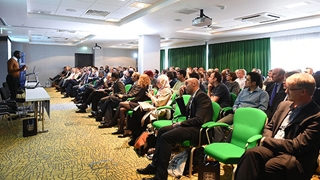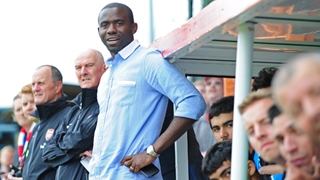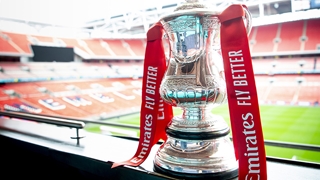
The former Bolton Wanderers and England Under-21s midfielder suffered a devastating cardiac arrest in March 2012 that stopped his heart for 78 minutes and required the combined efforts of ambulance staff, club doctors and a cardiologist to restart it.
Despite the seriousness of his condition, Muamba had shown no symptoms of his condition up until the moment he suddenly collapsed 43 minutes into Bolton Wanderers’ FA Cup tie against Tottenham Hotspur at White Hart Lane.
It’s a primary reason that at The FA’s first ever Cardiology in Football Symposium last week, the 26-year-old outlined the importance of The FA and PFA’s cardiac screening programme, which examines around 1300 academy players at the start of each season to identify and treat potentially life-threatening heart conditions.
"The FA and PFA cardiac screening programme is very good for two reasons," he explained to TheFA.com during the inaugural event, which was launched this year to highlight the ground-breaking findings of the screening programme and to provide uniform guidance for medical professionals working in sports cardiology.
"Number one, we are identifying the problems. And, number two, we are trying to rectify those problems at an early age.
"That way, we know which individuals are suffering in order to take care of them. We know the type of training they need to do and they know exactly what they have to do moving forwards."
The FA & PFA Cardiac Screening Programme
- Founded: 1997
- Total players screened: 10,479
- Players screened this season: 1,300
- Coverage: Academy players aged around 16 at Premier League, Championship, League One and Two academies
The fact that Muamba’s condition went unidentified is unfortunately not unusual, nor does it point to any medical mishap or oversight.
The truth is, it is an incredibly difficult condition to diagnose and one that is underlined by some challenging statistics - over 80% of players who harbour a potentially dangerous heart condition will show no signs of symptoms, while 17-20% of players who are screened will be given the all clear.
But while the challenges seem stacked against medical professionals, Muamba believes the screening programme and training events such as the Cardiology in Football Symposium will prove critical in balancing the odds.
"It is very difficult to prevent cardiac arrest. I had all the screening," he explained.
"All [doctors] can do is train themselves to the maximum [like they are today] that when they find themselves in that situation, they know what they are dealing with and know how to cope with whatever scenario."

Fabrice Muamba addressing the Symposium. The 26-year-old believes events such as this are critical to helping medical professionals identify heart conditions in young players.
It is three years since that night in north London and Muamba now lives a normal life – albeit with a pacemaker, something he points to with a wry smile as addresses the 100 medical professionals attending the symposium.
And as he does so, he reveals he is more aware of his heart than he had ever been as a player and, with his condition, he is grateful for that knowledge. He is also keenly supportive of more young players who are diagnosed with a potentially dangerous condition doing the same.
"Before the incident, I thought that my heart was beating fine and that there were no problems. The incident has taught me so much about my heart," he added.
"For young players, their head is all about football. When I was in football I know what it is like to be in that bubble where you don’t want to share information. Young players don’t pay attention to it, so we have to educate more players to it.
"So with those that get onto the football ladder it is important that when they get screened they study their own heart to get a better understanding of it."
As well as sharing his thoughts on the screening programme, Muamba provided an insight into what it is like to experience cardiovascular disease as a player.
But rather than retell a minute-by-minute account, he chose to instead speak simply and eloquently about those who worked together to save his life.
"Today I gave a brief message on what happened to me, but I wanted to mainly speak about the impact of how a good medical team working together under extreme pressure saved me," he revealed.
"I will always feel like I have the need to pass on the message about doctors and medical professionals because their job is the most difficult in the world. They are holding people’s lives in their hands.
"And the decisions the team made that day and the work that they did was critical to my surviving,and for that I will forever be thankful for what they achieved."
Muamba was speaking at The FA’s first ever Cardiology in Football Symposium, which welcomed over 100 medical professionals and provided an insight into the findings from The FA and PFA cardiac screening programme.
Since its inception in 1997, the programme has screened approximately 11,000 young players who are entering into their first professional contracts in order to identify and treat any potential heart conditions. Today, the programme works with around 1,300 players ahead of each season.







